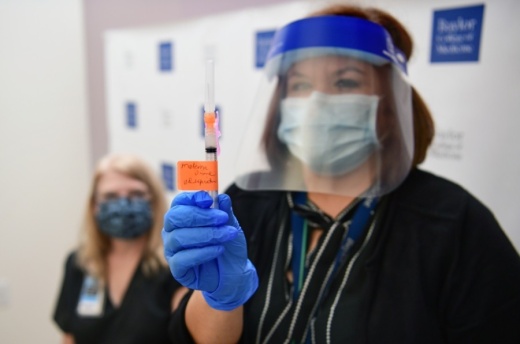However, county commissioners said they are concerned that outdated and unreliable data from the state on who is getting vaccines and where they are being distributed may lead to vulnerable populations slipping through the cracks.
"The reason why we don't have any kind of public dashboard with this information is because the information we have is sorely outdated," Hidalgo said at a Jan. 5 meeting of the Harris County Commissioners Court. "The state knows this, and they told us they are working on this. The data is so far off, it's not even worth analyzing or publishing."
In a unanimous vote at the Jan. 5 meeting, the court's five members instructed the county analyst's office to work with Harris County Public Health to track the administration of vaccines across all sources in the county, a task officials said could be challenging given the wide array of providers to receive vaccines from the state. For example, the 38,000 vaccines to be distributed across Harris County this week will go to 120 sources in Houston, Baytown, Cypress, Friendswood, Humble, Katy, Pasadena, Spring and Tomball, according to state data.
Precinct 4 Commissioner Jack Cagle said data collection is especially crucial given the growing populations in the county's unincorporated areas.
"Because almost half of our county isn't in a city, we're [the last resort]," Cagle said.
Around a million people in Harris County qualify to receive a vaccine as a part of the first two phases of the distribution effort, Hidalgo said. Under state guidelines, health care workers at risk of exposure to the coronavirus and residents and staff in long-term care facilities can receive the vaccine as a part of Phase 1A, while people age 65 and older and people with chronic medical conditions that increase risk fall into Phase 1B. An estimated 56,000 vaccines have been given in Harris County so far.
The county's public health department has only received around 7,000 vaccines so far, while the city of Houston has received about 10,000 vaccines, which are being distributed by the Houston Health Department. The vast majority of vaccines to arrive in the county were sent to private health care providers and nongovernmental entities, including private hospitals and pharmacies.
The county has been tracking its own data for the limited number of vaccines it has been able to administer, Hidalgo said.
"The thing to remember right now is we're talking peanuts—1 million people qualify, and we have 10,000 vaccines," she said. "Unfortunately, we can't have much of a solution besides what we're doing right now unless we get better data and/or we get a lot more vaccines in Harris County."
Hidalgo said she views the county's main goal as attempting to help people who qualify for vaccination but may have a hard time securing a vaccine through their jobs. Groups the county has reached out to with its limited supply of vaccines so far include teachers over age 65, people who work in mortuaries, jail medical staff and home health workers, Hidalgo said.
"Through our internal networks, we've reached out through those populations, ... and we've been able to quickly get those vaccines out the door," she said.
Unlike the city of Houston, the county did not open vaccine administration to the public, a decision Hidalgo said was made to avoid confusion and disappointment over how few vaccines were available at this point in time.
As vaccine distribution continues, Precinct 2 Commissioner Adrian Garcia suggested the county determine a set amount of vaccines it can administer per month and provide that number to Gov. Greg Abbott's office for future reference. He said this could help avoid issues that came up early on during the coronavirus testing process, where more people came to be tested than there were tests available.
"That way, we can take only those persons for [whom] we have vaccines instead of just doing a massive call-out and disappointing people," he said.
Moving forward, Hidalgo said it will be crucial for the state to send more accurate and timely data as well as more vaccines. In the meantime, officials said they will look into ways to gather data on vaccine distribution from across the county in a way where they will not have to rely on the state.





